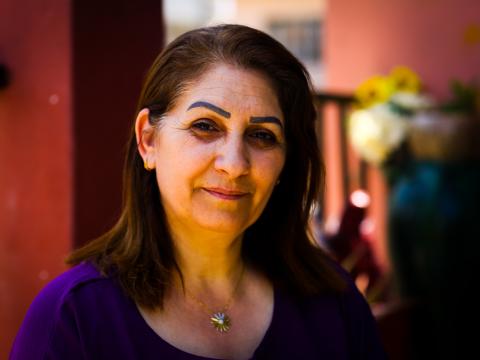Life, Displacement, and Regained Happiness

When Asmahan was in the sixth grade of primary school, her father pulled her out of school due to fears that she would get involved in political parties at a young age. During those days, her father was serving in the military and there were lots of political tensions in the country due to the Iran - Iraq war. Asmahan was devastated and in tears when she realized that she couldn’t continue her education.
After stopping her education, Asmahan would spend her days at home helping her mother with chores. She lived with the rest of her family made up of eight members in a modest simple house located in a peaceful neighborhood of Qaraqosh, 31.8 km away from Mosul. When her father retired from the military, he started working as a carpenter and later his other sons joined him as well in the profession. While Asmahan was staying at home, she would often help her mother who was as a tailor. Tailoring quickly became her favorite hobby. For most women, especially during those days, life was confined to the home. So it was natural that most stay-at-home girls or women would learn a hobby to keep busy. Sewing was a popular hobby in Qaraqosh.
As Asmahan reached the age of seventeen, she got married and moved in with her husband at her in-laws’ house. During those days, she felt happy and in peace. She even developed a close relationship with her sister-in-law. At that time, she would continue sewing and her sister-in-law would assist her. Asmahan reflected on those days saying, “Whenever I had free time I would sew. My sister-in-law who was younger than me would help me with sewing. We were all happy and had lots of children around us. I was sewing all the time for the family. I wanted to make the project bigger, and my family encouraged me to sew for other people in the neighborhood. But what affected me most during displacement was that the closest people to me had to travel outside the country, while others died, it was difficult a very difficult time.”
In 2014, when Asmahan was thirty-eight years old and a mother of four, the conflict started and she along with her family were displaced to Shaqlawa, a town in the mountainous area of Kurdistan Region of Iraq that is 66.5 km away from her hometown.
During displacement, Asmahan and her family couldn’t afford to rent a home and shared a space with other families in large halls. They received aid from charitable organizations and churches. Then, they moved to Ainkawa, in Erbil, 44.7 km away from Shaqlawa where they lived in caravans. During that period, Asmahan worked as a domestic worker in homes or tailored from her small caravan to support her family. She was the main breadwinner for her family since her husband couldn’t work due to his old age.
As the conflict ended, Asmahan and her family returned to Qaraqaosh to find a wrecked house. They began restoring it slowly. Asmahan would work odd jobs and sew to make ends meet for her family.
Recently this year, Asmahan heard about an opportunity for business development training and grants as part of the Safe Return Project, an Australian Aid initiative implemented by World Vision Iraq on behalf of the Australian Government. Asmahan submitted her application for this opening immediately. After a period of time, Asmahan received the news that she was accepted into the program. Asmahan attended a fifteen-day business training in Mosul. She shared, “We went to the training and the facilitators encouraged us a lot and even followed up with us. They taught us how to work, how to sell, and many other topics. The work was very nice, and we also participated in savings group.”
Asmahan continued, “before the displacement I had lots of clients. At least each week, I would, with the help of my sister-in-law, sew fifteen to twenty dresses. After the displacement, few people returned to Qaraqosh, and now even fewer people are living here. The number of tailors has multiplied. Now those who know that I returned to Qaraqosh, and that I started tailoring, are visiting me again. This month was very blissful with lots of clients. My income has increased recently by 75% percent. With an increased income, I bought necessities for my home, and I even helped with my daughter’s wedding needs.”
She continued, “When I got into this program and got this grant, I became very happy.”
Through the Safe Returns Project, 35 women and 5 men were trained in business development. 500 beneficiaries participated in savings group and 40 beneficiaries received grants to develop small projects.
Through projects such as this one, World Vision Iraq aims to help strengthen the business development skills of heads of households. The project will reach 1,260 households (7,560 individuals) in post-conflict affected areas in Hamdaniyah and Mosul.